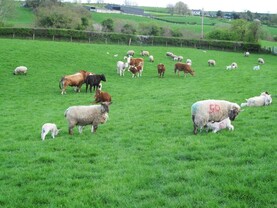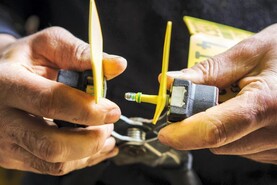Scientists at the Tyndall National Institute have claimed to have discovered a way of transmitting animal health information between a flexible electronics-free material to farm computers wirelessly.
The Tyndall institute - which is one of the institutes that hosts VistaMilk’s research centre - says the development will allow for ear tags or skin patches to transmit health and welfare information from cows when the devices are read by scanners similar to a barcode system.
VistaMilk’s principal investigator and research leader at Tyndall Dr Brendan O’Flynn pointed to the monitors as being potentially cheaper than other options available for transmitting cow data.
“We’ve got an inert, chipless, batteryless, flexible transmitter - and no electronics means no electronic waste, lower cost and easier production - and we’ve got sophisticated machine learning programmes to interpret the data,” O’Flynn said.
“At the moment, we’re able to gather information about animal welfare and well-being. In the future, we should be able to gather information about specific diseases and conditions.
“The antennas - or transmitters - could be wearable patches or bracelets that might enable the same monitoring of health data in humans.”
Digitising dairy
The new sensing technologies will secure the future of dairy farming in Ireland, director of the VistaMilk SFI research centre Donagh Berry said.
“VistaMilk’s aim is to digitalise dairy and this new tech takes us further down the road to a data-driven Irish dairy sector,” commented Berry.
“This development, and others like it, will allow for a more efficient and productive system that acknowledges and addresses the global climate challenge.
“It’s initiatives like this, helping us be more efficient and more productive, while mitigating environmental impact, that will secure the future of the dairy sector.”
VistaMilk is a collaborative effort funded by Science Foundation Ireland (SFI) and the Department of Agriculture.






 This is a subscriber-only article
This is a subscriber-only article









SHARING OPTIONS: